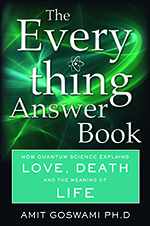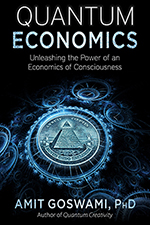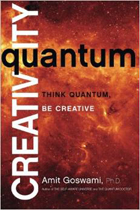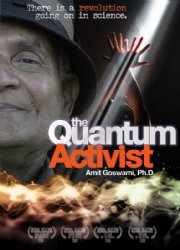In View of Rampant Elitism, Can Democracy and Capitalism Be Saved?
By Amit Goswami, Ph. D.
Elitism is rampant today. Even in America and Europe, the cradles of democracy, we are losing it. People talk more about income disparity in this country, but the truth is, gradually, in the last three decades, oligarchy, rule by an elite few, is replacing truly representative democracy. Economic disparity is only a symptom.
Can democracy be saved? Can capitalism be sustained? The answer is yes, but only if the worldview changes. Currently, there are two competing worldviews. First, there is the worldview of Christianity—religious elitism—which holds that there is a creator God who is also the ultimate ruler of the universe; on the judgment day, God doles out rewards and punishments to us humans depending on whether we have followed a path of virtue or sin in our lives. Religious elitism of Christianity, like that of all other religions, is an offshoot of spiritual elitism, an elitism of people who can understand and live by spiritual values such as love and goodness: In other words, an elitism of moral authority. When people are inspired by the moral authority of spiritual leaders and try to follow them, civilization progresses. In religious elitism, the idea gets corrupted: religious leaders don’t necessarily live by spiritual values any more. They just talk about them and uphold them with borrowed political power. Obviously, civilization suffers with this corruption.
Scientific materialism says everything is the movement of matter in space and time; there is no God, virtue or sin; all movement is the result of matter and material interactions. If instead of these two competing worldviews of Christianity and scientific materialism that have given us social and political polarization, we heed the message of the latest and most successful theory of science called quantum physics, we could save democracy. We could also find the answer to income disparity and save capitalism, to boot.
So why aren’t we doing it? The answer to that is easy. The elitists are also in charge in science, which is, after all, a social institution above all else bound by the same elitist culture of polarization. The scientific elite’s main job is to protect and expand its territory against the religious elite. It behooves scientists to set up some of the simplistic notions of popular Christianity—God as a white male emperor in heaven doling out rewards of heaven and punishments of hell, for example—as easy targets to refute and prove the superiority of scientific thinking. If you have ever read a book or heard a lecture by Richard Dawkins, you know what I mean. Don’t expect a scientist to act like the proverbial fool who sits on a branch of a tree and cuts off the very branch he is sitting on by embracing an integrative worldview. The scientists are too smart for that.
And it behooves the likes of Rush Limbaugh and Glen Beck to battle with a science based on scientific materialism and its equally simplistic ideas such as humans are machines, evolution is not purposeful, and there are no timeless values.
Before the advent of modern science, it was Christian elitism that ruled Western society. Eventually, it gave the West the Dark Ages. Modern science indeed rescued us. For three hundred years, science and religion coexisted under a philosophical truce—a worldview called modernism. Our internal experiences—vital energies, mind, soul, and spirit—are the territory of God and religion and the external experiences—the body and the outside world—are the territory of science. The great contributions of modernism are the three great institutions that we covet: democracy, capitalism, and liberal education. Democracy was founded on the intuition that all people are created equal—an affront to elitism. Capitalism came about to take the affront further: First, to distribute capital, and second, to spread the processing of meaning and values to all people. Liberal education was designed to save us from dogma that excludes people from fully participating in society.
But something strange happened to science as it, too, achieved the sweet smell of success. It became a dogma—scientific materialism, the idea that everything is matter and material movement. Like all dogma, scientific materialism also excludes and in this way creates a new elite. Before it was an elitism of spiritual/religious knowledge; it has since become an elitism of material knowledge. Initially, the slogan was “[worldly] knowledge is power.” But it eventually developed the more objective slogan, “information is power.”
The dogma of the religious worldview left out the material knowledge with which to better the human condition. The dogma of scientific materialism leaves out meanings and values to live by—the quality of living, the basis of civilization. Eventually, the burden of mass poverty initiated change from the religious worldview. And you cannot progress indefinitely on material prosperity any way because the finiteness of material resources and the environment creates barriers. This problem of sustainability is sinking the scientific materialist worldview.
So now there is a worldview polarization. We are caught between two dogmas, each an incomplete worldview without integration with the other. Fortunately, a hefty percentage of people are in the middle; they want to integrate, they want a complete worldview free of dogma, free of exclusivity, free of elitism. To integrate is to bring back the causal efficacy of both the mind (and God) and matter as in modernism.
Modernism failed because its inherent mind-matter dualism is not compatible with science—it’s dualism. How do the dual partners interact? In science all interactions are accomplished by signal exchange; signals carry energy. However, the energy of the material world never changes, energy of the material world never goes out to or comes in from another world. Quantum physics solves this problem of dualism in every respect. Here is a brief summary of how:
- Objects in quantum physics are waves of possibility residing in a domain outside of space and time distinguished by the fact that no signal is needed to communicate in this domain. Signal-less communications are called nonlocal.
- When we look, a wave of possibility—a multifaceted object, becomes an actualized and localized particle—somehow a single facet manifests.
- The nonlocal domain of potentiality where objects are possibilities is consciousness itself that is the agent of choice from a multifaceted wave of possibility to a one faceted manifest object.
- In this way, there is causation outside of matter. Call it downward causation since its causal agent—nonlocal consciousness—must be recognized as a non-ordinary “higher” state of consciousness than our usual familiar and local ego. Material “upward” causation (so called because all material causes arise upward from the base level of elementary particles whose interactions ultimately are the only material cause) produces the waves of possibility. It requires downward causation by a higher consciousness to convert possibility into actualities that we experience.
- It recognizes higher consciousness as “God” of religions and realizes that the basis of an integration of science (scientific materialism) and religions (religious elitism) is now a done deal.
- Further integration, legitimizing our internal experiences of feeling, thinking and intuition is easily achieved by positing four different worlds of possibility within nonlocal consciousness which is the ground of all being. The first, material, gives us the material world that we experience by sensing. The second, vital, gives us the experience of feeling when manifest. The third, mind, gives us thought and meaning when manifest. And the fourth, the supra mental world, gives us the archetypes that we intuit such as truth, goodness, love, beauty, justice, abundance, etc. The mind-body problem is now solved.
Coming back to elitism, does elitism go away in this integration? Does a quantum society achieve what historically no other human society has ever been able to achieve? The answer is yes.
The reason is subtle. A quantum society where the worldview is based on consciousness allows us outer creativity to accommodate information and material prosperity, no doubt. But the society also legitimizes subtle internal experiences and acknowledges the value of inner creativity that manifests subtle energies, that is positive emotions, meaningful knowledge, embodiment of archetypes, and even happiness in the form of wholeness. Inner creativity does not necessarily require acquiring sophisticated knowledge systems. And more importantly, the creative inner achievement makes you humble, not an elitist. Now that you have experienced transformation, you no longer are happy denying inner suffering by the carpet of material pleasures. If an inner creative has any authority, it is moral authority; it comes from nonlocal consciousness transcending separateness.
Today, we see Republicans and Democrats fighting with each other about how to help the poor. The Democrats want the government to help the poor because it is a disgrace that a rich country like the USA should have people going hungry. Republicans attribute poverty to people who don’t work hard enough. Republicans don’t approve of government coming to the aid of the poor because that only makes the poor even lazier. In a quantum society, we help the poor materially, yet we also teach them tools for inner happiness that reduce their material needs in favor of spiritual satisfaction with positive emotions, meaningful thinking, and archetypal values.
In view of the growing income disparity, we often lament how the American dream is no longer available to most people of our society. But by redefining it to include both material and spiritual prosperity in a quantum society, we restore the American dream.



